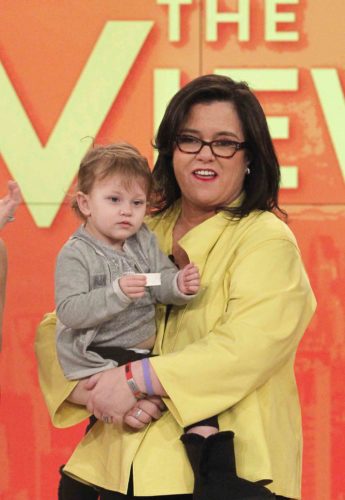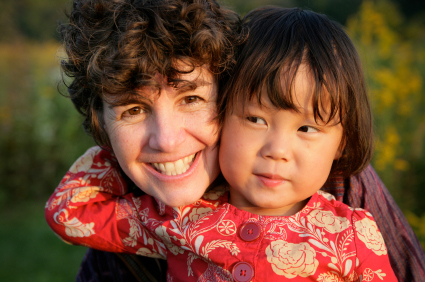More and more rainbow families are living in our country, although the current legislation is not exactly optimal. The saddest part is that in many cases the legal system doesn’t even discriminate against the same-sex couple themselves, but their child. A lot of information is available and experiences are shared by those affected, but I still see that many are uninformed and there are still some white areas. I want to answer questions regarding parenting and get some answers myself, hence this series of interviews. Besides the personal stories I’m also trying to compile a list of useful links for you.
First we can read the Eszter’s story who faced the adoption process while single in 2010 and who has since become the happy mother of a beautiful little girl.
(editor’s note - On her request names have been changed)
You adopted a child as a single woman. Was your sexual orientation brought up during the process?
Eszter: No, it was not. Even the psychologist didn’t ask, but it doesn’t mean they wouldn’t in case of other women. More than one of my gay male acquaintances who filed for adoption were asked if they are homosexual. It seems like they are more suspicious of single men. It’s better to be honest, because if we lie and it’s discovered during the process we could land ourselves in an unpleasant situation. (editor’s note - The answer must not influence the professionals negatively, and many positive examples show that indeed it does not.)
Were you worried that if they found out you were a lesbian it would affect the process negatively?
Eszer: Yes, I was worried it might have a negative effect on my adoption because I didn’t have a positive reference point. I started the process in 2010. Of course since then I have heard about successful adoptions by single lesbians or gay men or couples. (editor’s note - According to my knowledge most same-sex couples are open about their sexual orientation. Even though legally only one of them can adopt, it’s noted during the process that it’s actually a couple and the professionals are supportive.)

As single person did you feel disadvantaged compared to couples?
Eszter: Yes, I did. Even the law favours married couples. Singles often get the children from the national list. These are the children who are disadvantaged in the adoption process due to ethnicity, health issues or their age and weren’t wanted by anyone in their own county.
Could you summarise how it’s done? What can we expect?
Eszter: If someone made the decision to start the adoption process an appointment has to be made at the local TEGyESz (editor’s note - Local Child Protection Services) on phone. I first met with a lawyer who recorded my data. It’s important to note that right at the first session they asked the age and gender of the child I was looking for and what kind of health issues I was willing to take on. While officially they can’t keep record of ethnicity there’s a section on the data sheet where they can note if we made any stipulations regarding the child’s origins.
Discussing such stipulations with the administrator is vital, because I heard of a case where a couple had to wait for years because - even though it didn’t even cross their minds to make such a specification - the administrator just assumed that because they were white they would want a white child and they weren’t called back for a very long time. Also the identity of the father is often unclear: he’s a married man or the mother won’t tell who got her pregnant so on the data sheet the child’s origin is put as uncertain.
After meeting with the lawyer I had to go through a psychological evaluation where we had a free discussion about my reasons for wanting to adopt, what kind of childhood I had and I had to fill out some tests. I got my clearance after the first session but others might have to go back multiple times. I got the impression that while the specialists were psychologists their professional opinion was subjective. After that they came to make an environmental evaluation which consisted of seeing if the child would have enough space, what kind of environment would they grow up in and the administrator kind of generally checked me out too. Later I had to hand in an income certificate and had my GP certify that I wasn’t a freshly recovered cancer patient, drug addict or alcoholic.
After that I had to attend a course which I found very interesting, because they actually shared specialised, adoption-related information. They told us that the child will come into our lives with a baggage, and even though we aren’t related by blood, we have to be clear about their origins. They told us that if someone can’t accept a Roma child they should admit to it, because not being unconditionally accepted has a very bad influence on the child’s development.
They told us about the process of open and secret adoption and the pros and cons of both. (editor’s note - Open adoption is when the biological and the adopting parent know each other and so the biological parent knows where the child will end up after being adopted. Open adoptions are done predominantly through civil organisations. These organisations keep track of those filing for adoption on a national level. Keeping contact later isn’t unusual. Many choose this form of adoption, because the chances of getting to take home a newborn are fairly big. Since 2014 the parent who gave the child up can change their mind up until the child turns 6. In case of secret adoption, the biological and the adopting parent don’t know each other. The biological parent isn’t even notified about the adoption and they can not appeal against the decision or change it in any other way. Secret adoption is done through the Local Child Protection Services.) This part didn’t really concern me, but it was relevant for some couples, grieving for an unborn child was also discussed. I could see on many of them how difficult it is to speak of such deep feelings in front of strangers, but the course was really useful. In case of couples both parties are advised to take it. (editor’s note - It’s a common practice for same-sex couples that both partners take the course.) After that I got my certificate of aptitude and I was placed on the waiting list.
Did you make any stipulations regarding the child?
Eszter: Yes, I chose a girl between 0 and 3 years, no stipulations on ethnicity.
How long did you wait for the first offer? How were you chosen?
Eszter: I waited for 9 months. It’s very important to know that when a child is put into the system the first five people waiting for them are ranked by compatibility. (editor’s note - It’s important to note that children aren’t picked for parents, the best possible prospective parents are picked based on the child’s needs.) Married couples are ranked first, and if they don’t want to visit the child the next in line gets notified. Getting ahead in line can depend on the current life situation of the couple, if they have enough time for the child, for example: if someone’s sick or whether they can support the child financially. Out of the five candidates the last one is single at best.
The more accepting you are the sooner you get a child. Being flexible on age can also shorten the wait, but having no stipulations regarding ethnicity is what really speeds up the process. (‘The ethnicity of children declared fit for adoption can’t officially be recorded, and in many cases the specialists have minimal to no information regarding the child’s parents, so we can’t talk about either Roma or non-Roma children’ - source: https://orokbe.hu/english/the-hungarian-adoption-system/ )
While couples may wait 4-5 years for a white baby, they might be offered Roma or partially Roma children in only a couple of months.)

How did such an offering go for you?
Eszter: They called me on the phone. I had to go to TEGyESz and they showed me the files of the child. If the candidate wants to see the child in person, they are told - in accordance to their age - that a friend is coming to visit, but not about the possible adoption, so as to not get the child’s hopes up in vain. It was on my third offer that I decided to visit Réka, my - eventually - adopted daughter. At the first offer, based on the child’s photo I didn’t feel the chemistry needed for that certain karmic bond. At the second offer the child had grave health issues which I couldn’t undertake. But looking at the photos of Réka it didn’t take long to come to a decision because it felt like I was looking at my own pictures at one and a half years old. She was 18 months old when I got her at last. Furthermore, when I was told she had the same name I originally wanted to give my child I was convinced that it was her I’ve been waiting for.
Does it mean any disadvantage on the long run if - like you - someone doesn’t say yes to the first child offered to them?
Eszter: Officially no, and I didn’t experience it myself, but it may depend on the administrator.
Did you keep it secret from your daughter that she’s adopted?
Eszter: No. I think keeping secrets is a huge mistake. It’s the child’s essential right to know about their origins.
Does Réka know that her mum is a lesbian?
Eszter: Yes, she understands it more and more. As a single mum it’s harder to explain as she doesn’t see me having a partner, but I think it can be explained in an age-appropriate way.
How much having a child complicate dating?
Eszter: My kid is great for pre-selection. I wouldn’t want a partner who can’t accept my daughter. On the other hand, I have very little time for dating, that’s what’s more difficult. I’m looking for a partner online and I didn’t have any bad experiences because of that.
What advice would you give those who want to adopt? What would have been good to know back then?
Eszter: I think it’s very important that - because you can say no during the process - prospective adopters should give broader parameters, otherwise they might miss opportunities. It’s better to show up at the first hearing with definite specifications that still leave enough leeway: deciding on age limits or biological sex, or what sort of health issues they could deal with.
Just like in case of a biological child it’s important to save up some money, because when you have to go visit the child it’s often not in your own county and you either travel or move there for a while. I moved there for several weeks and spent time with Réka every day. This bonding period is very important, because the child is given to the person who really connects with them. When you bring them home it’s best to spend more time with them and that unfortunately means you can’t work. Furnishing the child’s room isn’t cheap. Depending on the child’s age family aid might also change which might mean a further financial burden.
Translated by Zsófia Ziaja
Sources and useful links (some of them are available only in Hungarian):
https://orokbe.hu/english/the-hungarian-adoption-system/
http://www.ksh.hu/docs/hun/xftp/stattukor/orokbefogadas.pdf
http://csalad.hatter.hu/cikkek/azonos-nemu-szulok-es-gyermekeik-szivarvanycsaladok-interjuk-2016-17

